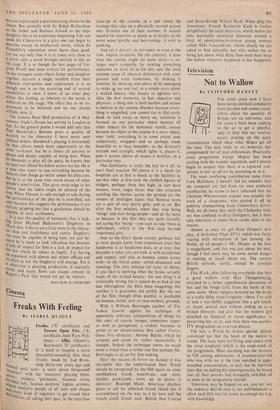C inelyia
Freaks With Feeling
By ISABEL QUIGLY
Freaks. ('X' certificate) and armed until now : a story about fairground :ionsters' with the 'monsters' playing them- be yes : midgets, 'pin-heads,' Siamese twins, arded lady, 'human skeleton,' legless, armless, antild°st bodyless people of all sizes and shapes de, every kind of ingenuity to get round their tormities, all taking their part, in the merciless close-up of the cinema, in a tale about the revenge they take on a physically normal person who ill-treats one of their number. It sounds squalid (in intention as much as in result), in the worst sense horrific and hair-raising: .1 went in quaking.
And yet it doesn't, in retrospect or even at the time, inspire revulsion. On the contrary, it does what the cinema might do more often—it en- larges one's sympathy by treating something unknown to most of us lin this case the most extreme cases of physical deformity) with com- passion and even tenderness; by making it familiar; by showing. and above all by managing to make iv see and feel, in a simple story about a wicked beauty, that beauty or ugliness isn't, after the first moments, in fact objective and physical : a thing that is both hardest and easiest to believe in the cinema. Hardest because every- thing is magnified, you cannot (as in life) easily blink or look away or hurry on, attention is focused, on one particular object because all other objects (in the darkness) vanish; easiest because no object in the cinema is a mere object, seen 'cold,' everything is to some extent seen subjectively, wrapped—and so perhaps made beautiful or at least bearable—in the director's attitude and eyesight, which lights it, places it, puts it across, above all makes it familiar, in a particular way.
This familiarity is really the key to-it all, to one's final reaction. Of course it is a shock (as hospitals are 'at first' a shock to the healthy) to see that what at first look the childish figures of midgets, perhaps three feet high, in fact have mature, worn, tragic faces; that tiny creatures scuttling like beetles across the ground are the owners of intelligent faces; that Siamese twins are a pair of very pretty girls, and so on. But after the first minutes, when they stop being `things' and start being people—and all the more so because in this film they are, quite literally, not acting but 'being'—you start to take them as individuals, which is the first step beyond impersonal pity.
And so the film's theme (corny, perhaps, but as most people know from experience true) that handsome is as handsome does, or at least that bearable is what you can look at with acceptance and respect, and take as human, comes across with—in the literal sense—awful eloquence and meaning. The only mistake (of taste, of theme, if you like) is showing what the freaks actually made of the wicked beauty : for one thing it is artistically wrong, for it cannot be as bad as one had (throughout the film) been imagining; for another it is gruesome, not pitiful. But the rest of the film, though often painful, is justifiable on human, moral, eery or even aesthetic grounds.
With it William Burroughs (author of The Naked Lunch) applies his technique of apparently arbitrary juxtaposition of things (in this case, of course, images, sometimes super- as well as juxtaposed, a trickier business in print) to an eleven-minute film called Towers Open Fire (director: Antony Balch), which he scripted and acted in; rather successfully, I thought. Indeed the technique seems so much more a visual than a verbal one that perhaps Mr. Burroughs is all set for film-making.
After the success of Never on Sunday it was inevitable that the sophisticated New World should be enraptured by the Old again on some tumbledown Greek waterfront, and Aliki, deathly predictable, turns up to prove it (director: Rudolph Mate). American playboy plans to sell his inherited Greek island but is overwhelmed on the way to it by love and the (much cited) Greek soul. British Jess Conrad
and thrice-British Wilfrid Hyde White play the Americans; French Katherine Kath is (rather delightfully) the local mayoress, which makes the only nationally unaltered character around a kind of eponymous-in-reverse young woman called Aliki Vouyouklaki, whom, clearly we are asked to find adorable, but who strikes me as being just about what Baby Jane must have been like before whatever happened to her happened.


































 Previous page
Previous page